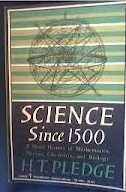 Review of Science history Humphrey T Pledge: Science Since 1500
Review of Science history Humphrey T Pledge: Science Since 1500 Brilliant Overview of How All Sciences Developed, August 8, 2010
Brilliant Overview of How All Sciences Developed, August 8, 2010This latest reprint appears to be the 1966 edition, which is a reprint of the original 1939 best-selling first edition. It was published as a 'Harper Torchbook' in the USA.
Pledge worked in the (London) Science Museum Library from about his mid-20s. His Cambridge degree was in the 'Natural Sciences'—a B.A. in those days. The title is slightly misleading—there are four chapters up to about 1600, after which the story deals with individual centuries. Pledge's sources were mostly books—I don't think he did original research—including G Sarton at Harvard, and both specific and general histories. He seems to have read German. He included the social background in his book, and makes many shrewd comments. There's an index of proper names—I estimate about 1,200 men along with place names and institutions. And an index of topics—about 1,500 starting with abacus, ending with zoology. There are three interesting charts of great scientist-teachers, family-tree style outlines of who learned what from whom. And maps of scientists' birthplaces, plus of course some plates on art paper.
Possibly for space reasons, technology is a bit under-represented—there's nothing on radio, despite this being an important force at the time he wrote. Nothing on weapons.
The value of this book is that it is entirely free of the modern 'politically correct' Frankfurt/neo-Marxist style rubbish. There are no claims that the USSR invented everything, or blacks. Moreover wideawake people are aware that science has been corrupted, partly in fact as a result of US/Jewish frauds and money—it has to be said. So a lot of biology research, much of NASA, much medical research including AIDS, climate science etc is so inaccurate that it is best omitted. So this book is not really out of date, except of course for not including lasers, computers, jet engines, plastics—most of which are technology, in any case. If you'd like a short accurate account of the discoveries of what makes food; what thermodynamics is about; how nuclear physics developed; the origins of geology; the structure of matter... this book is a very valuable one-volume summary. I do have a slight reservation—Pledge is slightly conventional—Semmelweis, for example, seems to have been driven mad by the medics of his time refusing to wash their hands, and thus refusing to spare women from death, and though Pledge hints at this, he's not condemnatory. Similarly with the inaction over scurvy in sailors, when it was known how to prevent it.
I said above, 'he makes many shrewd comments'. Here are some examples:-
BOTANY AND FAUNA: 'Natural history.. took its rise in regions of varied.. or remarkable flora, fauna, or rocks.. the Alpine mountain system, [with] forms appropriate to very different climates in close contrast; islands with their long-isolated life; Scandinavia, where the operation of cold and other .. limiting factors is evident'
GENETIC RESEARCH: 'Cistercians by greatly improving the wool-bearing quality of English sheep, laid one foundation of this country's economic supremacy... Mendel's was no new activity within monastic gardens.. the forbidding lengths of time needed on present methods [ie pre-D.N.A.] for acquiring genetic knowledge. No way of life is more fitted than the monastic to afford the necessary continuity...'
ORIGIN OF ZOOS: 'It is easy to preserve dead plants by drying them, but .. [not] dead animals... The collection of live animals .. by the end of the 15th century had become a choice form of ostentation for princes with venturesome mariners and curious minds. Lisbon, the capital city of the earliest explorers, had one of the earliest zoological gardens. ...'
MEDICINE: 'Military medicine often led to improvements: 'rulers indifferent to the fate of their civilian subjects were very much alive to that of their soldiers, and we shall note many decisive biological advances made by military surgeons'.
Pledge is detailed, but compressed, on the history of ideas; interesting to (for example) see how Galen was transmitted, both through Avicenna and Gerard of Cremona.
Plenty more—mathematics, attitudes to the universe, Harvey on the heart as a pump at a time when pumps were introduced to drain British wetlands, evolution, the importance of glass....
Highly recommended to anyone wanting a shrewd one-volume account of people, ideas, inventions, and discoveries. This book is downloadable free.
Pledge unfortunately died relatively young (1903-1960); he might have established a faculty somewhere on the history of science. His papers (donated by his wife) are held in 'The Keep', which is connected in some way with Sussex University. Most '... are related to Pledge's projected synthesis of knowledge.' These boxes may well be interesting; but I don't know whether anyone has taken them very seriously.